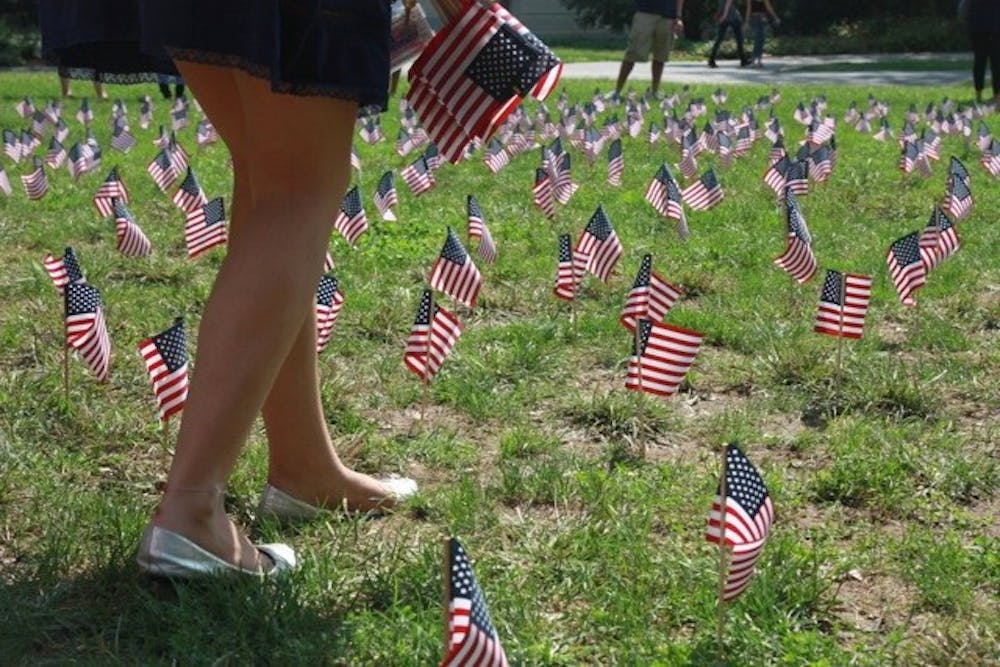Serge Riddell was not tying his shoes fast enough, as usual, and had been begging his father for a new toy on the way to school Sept. 11, 2001, when a hijacked plane streaked across the bright blue sky and struck the first twin tower.
That morning, James Hare was writing the date in his notebook. Anthony Martinez was sitting in homeroom. The day had started as usual. That Tuesday morning, most middle school-aged Americans were doing nothing monumental.
Then at 8:46 a.m., thousands of lives were lost, as was the innocence of a generation not yet even on the cusp of its teen years.
“We had an optimistic outlook on life,” said Martinez, a junior in the School of Communication. “It brings anger because it changed who we were.”
Martinez recalled the confusion of students and parents outside his school in the Bronx. Hysteria had swept through the borough, Martinez said, with rumors circulating of bombs planted in courthouses and of another immediate attack.
Unlike most Americans, who watched the events unfold on television, Martinez had to listen to the radio. He was one of the many New Yorkers who received their cable connection from the antenna at the top of the World Trade Center.
Hare, a junior in the School of Public Affairs, lived 10 miles outside the city in Bergen County, N.J. His father worked only a half-mile away from the World Trade Center.
“His office was just completely covered in dust,” Hare said.
In Alpine, N.J., Greg Saperstein watched across the Hudson River from a state lookout as billowing smoke issued from the New York skyline.
“You could smell the smoke and the fire,” said Saperstein, a senior in SOC.
From her home in Staten Island, Alexis Zayfert also saw the smoke. Earlier that year she had gone to a Staten Island Yankees game for her birthday and seen the towers from afar.
“My mother took a picture of me at the game with the twin towers in the background,” said Zayfert, a senior in the Kogod School of Business. “She even drew an arrow towards it.”
For a week, Zayfert and other New York residents were on lockdown. Sirens blared constantly from fire engines and police cars. Years after 9/11, her family moved from that house, but her memories are still vivid.
“Whenever we drive by, I can see the smoke,” Zayfert said. “It’s forever etched in my mind.”
In D.C., the feeling of panic, uncertainty and grief was similar after the plane hit the Pentagon.
Serge Riddell, a sophomore in SPA, was in fourth grade at the time. His mother contacted his father, who worked at the Federal Trade Commission downtown, and advised him to walk back to his home in northwest D.C.
As Riddell’s mother’s eyes were glued to the television, he played with his toys.
“None of us had any idea,” he said.
Younger students like Riddell have foggier recollections of 9/11, but still remember the despair of that day. Meridian Ganz-Ratzat, now a junior in the College of Arts and Sciences, was eight years old at the time.
“From my understanding, I was just really sad about all the people getting hurt,” she said.
She watched the coverage at her friend’s house in Silver Spring, Md. She said that when the plane hit the Pentagon, another wave of grief came over her, but not in the same way as it did when she heard about the attacks in New York.
A decade later, some of those emotions are still raw, she said. On the eighth anniversary of 9/11, during Zayfert’s freshman year at AU, her anguish flooded back while she watched coverage of the day’s commemorative events.
“I just broke down,” Zayfert said. “I thought, ‘I should have been more scared.’”
For others, 9/11 brought not only uncertainty, but also anger.
“My confusion turned into anger,” Saperstein said. “I didn’t know who to trust.”
And while Americans memorialize the victims of the attack every September, some students believe the heroes who pulled victims from the wreckage are often forgotten.
“It was so disheartening that Congress took so long to pass the bill for the health benefits of the first responders,” Riddell said. “We’ve lost that unifying feature.”
lgiangreco@theeagleonline.com





